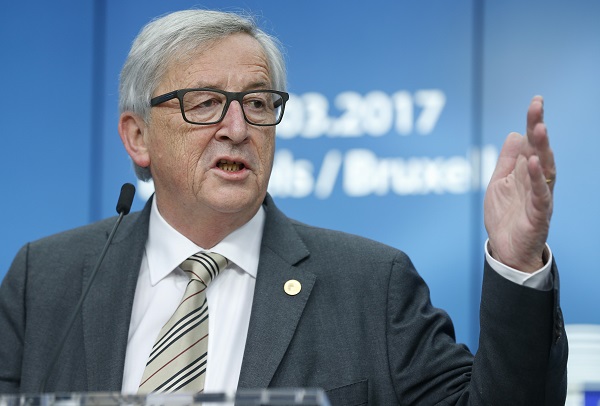Juncker expresses optimism in European State
Published : 14 Sep 2017, 01:25
Updated : 14 Sep 2017, 02:45
Europe is finally bouncing back after years of crisis and shows optimism for the future, said European Commission President Jean-Claude Juncker in his annual State of the Union address on Wednesday.
Junker made the remarks to Members of the European Parliament gathered here for their first plenary session after the summer break.
Citing an all-time low in unemployment across the EU, strengthened European banks, and drops in public deficits, Juncker said "all of this leads me to believe the wind back in Europe's sails."
Juncker also outlined policy proposals for the coming year, including reinforced trade programs focusing on reciprocity, stronger protocols for foreign investment screening, new industrial policy to keep Europe competitive while becoming a vanguard in the fight against climate change, increased digital security online led by a new cyber security agency, and continued deepening of cooperation between EU member states on migration issues.
Throughout his description of proposals, Juncker celebrated the achievements, such as 8 million jobs created in the EU since the beginning of his term at the European Commission, or a 97-percent decrease in irregular migrant arrivals by sea since the implementation of the EU-Turkey agreement.
To take advantage of this momentum, the European Commission president urged European leaders and MEPs to strive for a "stronger, more democratic Europe."
Laying out the details of a so-called "Scenario #6," or a European Commission White Paper published in March 2016 which outlined five possible scenarios for the future of the European Union, Juncker turned down what has been called a "multi-speed Europe." He argued for greater integration in nearly all areas of European functioning.
"The Euro is destined to become the common currency for the entire Union," he said.
Juncker refused calls, popularized by French President Emmanuel Macron when he was campaigning in 2016, to set up a separate parliament for countries using the common currency. "There is only one parliament for the Euro area: this one," he told the MEPs.
He also argued that all EU member states should be encouraged to join the banking union, saying that only joint efforts to limit and mitigate risks would lead to long-term economic stability.
"It is high time to bring Romania and Bulgaria into the Schengen area," Juncker announced, adding that Croatia should also be brought into the free-movement zone as soon as it meets requirements.
In a similar manner, Juncker said that all members should contribute to a European Defense Union, arguing that such an initiative needs to be implemented by 2025.
On institutional reform, Juncker proposed that the presidencies of the European Commission and the European Council be merged. "Europe would be easier to understand if one captain was steering the ship," he said, "Having a single president would better reflect the true nature of our European Union as both a Union of States and a Union of Citizens."
He also proposed a European Minister of Economy and Finance, a role to be fulfilled by the European Commissioner in that area, as well as a new European Labor Authority.
"It seems absurd to have a Banking Authority to police banking standard, but no common Labor Authority for ensuring fairness in our single markets," he said.
To support transparency, Juncker revealed that the European Commission would start publishing all draft agreements for trade negotiations.
He also argued for continued EU enlargement, specifically addressing Turkey, saying "from our side there will always be an out-stretched hand."
Finally, Juncker addressed Brexit, saying it was not the "end all be all" for Europe, and that it was not the future of Europe.
Proposing a special European Summit to be held in Romania on Brexit Day, March 30, 2019, Juncker hoped the Europeans would wake up to a Union of 27 member states where European standards would be shared by all European citizens.
"But it's today that we have to start preparing the Union of tomorrow," he said. "We have to do it now while the sun is still shining."


